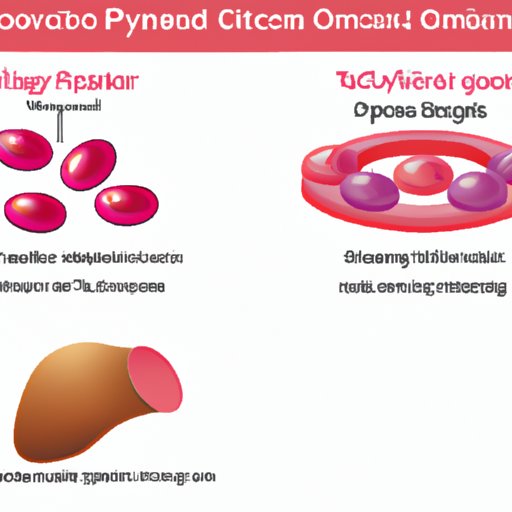
Introduction
Ovarian cysts are fluid-filled sacs that develop in the ovaries. They can vary in size and may be detected during routine gynecological exams or medical imaging tests. Most ovarian cysts are benign and resolve on their own, but some may require medical intervention.
Weight gain is a common concern among women with ovarian cysts, leading many to wonder if there is a link between the two. In this article, we aim to clarify the relationship between ovarian cysts and weight gain, provide tips for managing weight gain caused by ovarian cysts, and discuss a specific type of ovarian cyst associated with weight gain: polycystic ovary syndrome (PCOS).
The Link Between Ovarian Cysts and Weight Gain: What You Need to Know
There are several types of ovarian cysts, including functional cysts, which form during the menstrual cycle and can resolve on their own, and other types, such as dermoid cysts or cystadenomas, which may require medical intervention. Both types of cysts can cause weight gain, but they do so in different ways.
Functional cysts, which are the most common type of ovarian cyst, can cause weight gain due to hormonal fluctuations. These cysts form within the ovary during the menstrual cycle and can become filled with fluid or blood. As the cyst grows, it may produce more estrogen and progesterone, leading to weight gain and other symptoms such as bloating or breast tenderness.
Other types of cysts, such as dermoid cysts or cystadenomas, can cause weight gain due to their size and location. Large cysts can place pressure on surrounding organs and tissues, leading to abdominal discomfort, bloating, and weight gain.
Exploring the Connection Between Hormones, Ovarian Cysts, and Weight Gain in Women
Hormones play a crucial role in the development of ovarian cysts and can also affect weight gain. Estrogen, a hormone produced by the ovaries, plays a critical role in regulating fat distribution in the body. Higher levels of estrogen are associated with increased body fat and an increased risk of weight gain.
Progesterone, another hormone produced by the ovaries, helps regulate metabolism and fat storage. Changes in progesterone levels can affect weight gain and contribute to the development of ovarian cysts.
It is essential to maintain hormonal balance to prevent ovarian cysts and other related issues. Women with imbalances in estrogen or progesterone levels may experience irregular menstrual cycles, weight gain, and other symptoms.
Debunking the Myth: Do Ovarian Cysts Really Cause Weight Gain?
While it is true that ovarian cysts can cause weight gain, other factors can contribute to weight gain in women. For example, lifestyle factors such as diet, exercise, and stress can all affect weight gain and overall health. Other medical issues such as thyroid disorders, insulin resistance, and polycystic ovary syndrome (PCOS) can also contribute to weight gain.
Evidence-based research suggests that there is a weak association between ovarian cysts and weight gain. While some women may experience weight gain due to hormonal fluctuations associated with cysts, the weight gain is often minimal and temporary.
Managing Weight Gain with Ovarian Cysts: Tips and Strategies for Women
If you are experiencing weight gain due to ovarian cysts, there are several things you can do to manage your symptoms. The following tips may help:
- Eat a balanced and healthy diet that is low in processed foods and rich in fruits, vegetables, and whole grains
- Engage in regular exercise, such as walking, yoga, or swimming
- Practice stress management techniques, such as meditation or deep breathing
- Take care of your overall health by getting regular check-ups and following your doctor’s advice regarding any medical issues
- Consider speaking with your healthcare provider about hormonal birth control or other medical interventions if your ovarian cysts are causing significant discomfort or other symptoms
Understanding Polycystic Ovary Syndrome (PCOS) and Its Impact on Weight Gain
Polycystic ovary syndrome (PCOS) is a hormonal disorder that affects women of reproductive age and can cause weight gain and other complications. Women with PCOS produce excess androgen hormones, which can disrupt the menstrual cycle and lead to the development of ovarian cysts.
PCOS is also associated with insulin resistance and an increased risk of developing metabolic syndrome, a condition characterized by high blood pressure, high blood sugar, and high cholesterol. These factors can contribute to weight gain and make it challenging to lose weight.
If you suspect that you have PCOS, it is essential to speak with your healthcare provider. Diagnosis and early treatment of PCOS can help prevent complications such as diabetes, heart disease, and infertility, and help manage weight gain associated with the condition.
Conclusion
Ovarian cysts are a common condition that affects many women and can sometimes cause weight gain. However, it is essential to understand that other factors can also contribute to weight gain and that the link between ovarian cysts and weight gain is weak.
If you are experiencing weight gain or other symptoms related to ovarian cysts, it is essential to speak with your healthcare provider. They can help you manage your symptoms, rule out any underlying medical issues, and provide appropriate treatment if necessary.
By taking care of your overall health, maintaining hormonal balance, and seeking medical advice when needed, you can manage your symptoms related to ovarian cysts and maintain a healthy weight.


